

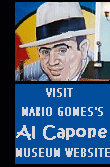
|
Now Playing


"They talk about me not being on the legitimate. Why, lady, nobody's on the legit when it comes down to cases, you know that."
--AL CAPONE
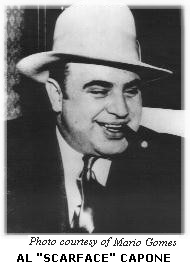 Al Capone never could have made it as a model for collar ads: He had a flat nose, thick lips, a bull neck and a scar from his left ear to his lip. He liked to call it a war wound but it really was a memento of a knife fight in a Brooklyn dance hall. Al only made the fourth grade in school but he proved that a diligent, dedicated man could go far without formal education. He came up the hard way: street fights, petty thefts, warehouse heists, rough stuff in New York's Five Points Gang, two murder raps to shake off. In this process, the boy from Brooklyn developed a suitable boldness for the years ahead.
Al Capone never could have made it as a model for collar ads: He had a flat nose, thick lips, a bull neck and a scar from his left ear to his lip. He liked to call it a war wound but it really was a memento of a knife fight in a Brooklyn dance hall. Al only made the fourth grade in school but he proved that a diligent, dedicated man could go far without formal education. He came up the hard way: street fights, petty thefts, warehouse heists, rough stuff in New York's Five Points Gang, two murder raps to shake off. In this process, the boy from Brooklyn developed a suitable boldness for the years ahead.
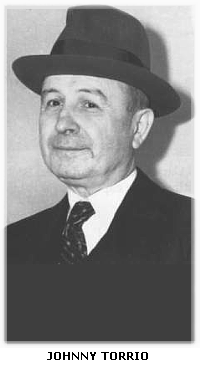 Johnny Torrio brought Al Capone to Chicago in 1920. The stocky hoodlum started out as a mere bodyguard but soon was put in charge of the Four Deuces Cafe, the South Wabash Avenue pleasure dome where Torrio maintained his headquarters. The Cafe had a saloon on the first floor, gambling traps on the second and third and girls-for-hire on the top story--for those who got past the lower plateaus both solvent and willing. Capone, then known as Scarface Al Brown, handled the cafe and other chores so well that Torrio put him in charge in 1923 when the Syndicate branched out into Cicero and the other neighboring towns tapped for exploitation. Pretty soon Scarface was wearing Chesterfield overcoats and monogrammed shirts and looking very much the gentleman.
Johnny Torrio brought Al Capone to Chicago in 1920. The stocky hoodlum started out as a mere bodyguard but soon was put in charge of the Four Deuces Cafe, the South Wabash Avenue pleasure dome where Torrio maintained his headquarters. The Cafe had a saloon on the first floor, gambling traps on the second and third and girls-for-hire on the top story--for those who got past the lower plateaus both solvent and willing. Capone, then known as Scarface Al Brown, handled the cafe and other chores so well that Torrio put him in charge in 1923 when the Syndicate branched out into Cicero and the other neighboring towns tapped for exploitation. Pretty soon Scarface was wearing Chesterfield overcoats and monogrammed shirts and looking very much the gentleman.
Cicero, mother lode of the suburban gold mines, was an empire unto itself. It stood so high above the law that the Syndicate designated its own dummy candidates for public office and then put gunmen in the polling places to see that they got voted in. The Chicago police interfered in one election there and Frank Capone, Al's brother, died in the ensuing gunplay. The Syndicate retained control. Indeed, Capone's iron rule was such that the police stood amiably by one day when he lost his temper over some trifling matter and knocked down Mayor Joseph Z. Klenha on the City Hall steps.
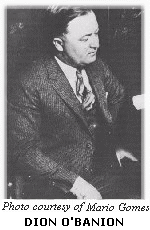 Even with that kind of Hollywood-style melodramatics the nation paid little attention to Cicero and the lesser baronies outside the Windy City. There was too much going on in Chicago itself: the assassination of Dion O'Banion ("His head got away from his hat," Capone said), the war between the O'Banion heirs and the House of Genna, the attempt on Torrio's life, the battle over the Unione Siciliana and the political warfare between Big Bill Thompson's corrupt Republican machine and the reform administrations of Mayor Dever. So Capone stayed out of the papers, for the most part, until the chilly, bullet. riddled afternoon of September 20, 1926, when an armed convoy rode down on him in Cicero.
Even with that kind of Hollywood-style melodramatics the nation paid little attention to Cicero and the lesser baronies outside the Windy City. There was too much going on in Chicago itself: the assassination of Dion O'Banion ("His head got away from his hat," Capone said), the war between the O'Banion heirs and the House of Genna, the attempt on Torrio's life, the battle over the Unione Siciliana and the political warfare between Big Bill Thompson's corrupt Republican machine and the reform administrations of Mayor Dever. So Capone stayed out of the papers, for the most part, until the chilly, bullet. riddled afternoon of September 20, 1926, when an armed convoy rode down on him in Cicero.
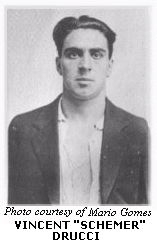 There were eight touring cars in the deadly battalion that raked the Hawthorne Hotel, the Capone GHQ. The wonder was that nobody got killed in the greater clatter of machine-gun fire as the sedans rolled slowly by. Capone hugged the floor of the hotel's restaurant and emerged with nothing more than flecks of dust on his tailor-made suit. "What shooting?" he asked when the ever-friendly local police came by. Then Cicero's Duce took steps to see that a neutral casualty--a woman hurt by stray bullets and flying windshield glass--received proper medical care. He boasted later that he spent $10,000 saving the lady's eyesight.
There were eight touring cars in the deadly battalion that raked the Hawthorne Hotel, the Capone GHQ. The wonder was that nobody got killed in the greater clatter of machine-gun fire as the sedans rolled slowly by. Capone hugged the floor of the hotel's restaurant and emerged with nothing more than flecks of dust on his tailor-made suit. "What shooting?" he asked when the ever-friendly local police came by. Then Cicero's Duce took steps to see that a neutral casualty--a woman hurt by stray bullets and flying windshield glass--received proper medical care. He boasted later that he spent $10,000 saving the lady's eyesight.
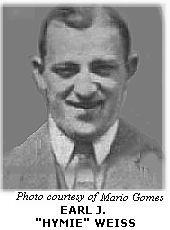 The daylight raid on Fortress Capone generally was attributed to Deanie O'Banion's avenging angels, Hymie Weiss, Schemer Drucci and Bugs Moran. Weiss paid with his life three weeks later. He was cut down by six assassins opposite the Holy Name Cathedral in Chicago, and Capone himself wrote the epitaph. "Hymie is dead because he was a bullhead," he said. "Forty times I've tried to arrange things so we'd have peace and life would be worth living but he couldn't be told anything." Drucci followed Weiss to the grave by a curious route--a young cop blew his brains out in a quarrel of sorts while taking him to a station house for questioning over some election-day polling-place bombings.
The daylight raid on Fortress Capone generally was attributed to Deanie O'Banion's avenging angels, Hymie Weiss, Schemer Drucci and Bugs Moran. Weiss paid with his life three weeks later. He was cut down by six assassins opposite the Holy Name Cathedral in Chicago, and Capone himself wrote the epitaph. "Hymie is dead because he was a bullhead," he said. "Forty times I've tried to arrange things so we'd have peace and life would be worth living but he couldn't be told anything." Drucci followed Weiss to the grave by a curious route--a young cop blew his brains out in a quarrel of sorts while taking him to a station house for questioning over some election-day polling-place bombings.
A period of comparative peace and quiet set in after that. Government agents estimated that the new tranquility boosted the Capone empire's cash take to unexplored heights in 1927. This was the breakdown:
Beer, liquor, home-cooked alcohol ...$60,000,000
Gambling places and dog tracks ......$25,000,000
Brothels, dance halls and inns ........$10,000,000
Miscellaneous rackets ...................$10,000,000
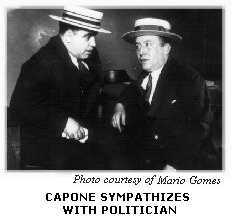 The cold statistics, however mountainous, hardly told the Capone story in terms of its real impact on the American scene in the Lawless Decade. A garden-variety hood spawned in the poolrooms and gutters of New York, Scarface Al rose to heights never before scaled. He was the New Power, bigger than the city and bigger than the state. He was the Mayor, Governor and Machine Boss all rolled into one. He gave the orders; the people's elected servants carried them out and kept their mouths shut. Capone's iron rule embraced not only Chicago but whatever other parts of Illinois he had the time and inclination to exploit. His authority was so great it could not be measured.
The cold statistics, however mountainous, hardly told the Capone story in terms of its real impact on the American scene in the Lawless Decade. A garden-variety hood spawned in the poolrooms and gutters of New York, Scarface Al rose to heights never before scaled. He was the New Power, bigger than the city and bigger than the state. He was the Mayor, Governor and Machine Boss all rolled into one. He gave the orders; the people's elected servants carried them out and kept their mouths shut. Capone's iron rule embraced not only Chicago but whatever other parts of Illinois he had the time and inclination to exploit. His authority was so great it could not be measured.
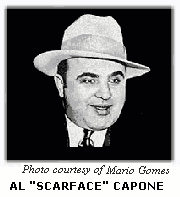 Thus two men were convicted in gang murders in a four-year period during which Capone and his mob rivals knocked off 227 men. Thus Big Bill Thompson ran for Mayor of Chicago against the reformer Dever in 1927 with a crystal-clear pledge of a wide-open town. "We'll not only reopen places these people have closed," Thompson said, "but we'll open 10,000 new ones." It sounded more like a promise to Capone than to the electorate, and it figured. The Syndicate stood behind the Thompson campaign with a fortune in cash and a formidable armed force besides. James M. Ragen, the racing-wire magnate, later murdered, termed the Capone mob "as strong as the United States Army." It wasn't, of course, but it surely was as strong as the City of Chicago itself after Thompson ousted the old-fashioned Dever. How strong? Fred Pasley, Capone's biographer, referred to the swarthy racket overlord as "the municipal cabinet member without portfolio--Commissioner of Lawlessness. To the upright Drys he was anathema, to the downright Wets a public benefactor, to the politicians Santa Claus." No power either as brazen or as great as Al Capone's ever existed before in an American metropolis. Perhaps none would again; the underworld syndicates that came in his wake, while formidable indeed, never ran quite as wild and free as Capone's.
Thus two men were convicted in gang murders in a four-year period during which Capone and his mob rivals knocked off 227 men. Thus Big Bill Thompson ran for Mayor of Chicago against the reformer Dever in 1927 with a crystal-clear pledge of a wide-open town. "We'll not only reopen places these people have closed," Thompson said, "but we'll open 10,000 new ones." It sounded more like a promise to Capone than to the electorate, and it figured. The Syndicate stood behind the Thompson campaign with a fortune in cash and a formidable armed force besides. James M. Ragen, the racing-wire magnate, later murdered, termed the Capone mob "as strong as the United States Army." It wasn't, of course, but it surely was as strong as the City of Chicago itself after Thompson ousted the old-fashioned Dever. How strong? Fred Pasley, Capone's biographer, referred to the swarthy racket overlord as "the municipal cabinet member without portfolio--Commissioner of Lawlessness. To the upright Drys he was anathema, to the downright Wets a public benefactor, to the politicians Santa Claus." No power either as brazen or as great as Al Capone's ever existed before in an American metropolis. Perhaps none would again; the underworld syndicates that came in his wake, while formidable indeed, never ran quite as wild and free as Capone's.
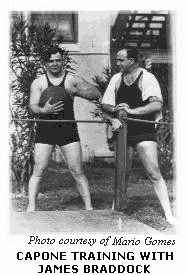 The payroll of the Midwest underworld czar's private army-including the lavish "ice" handouts to the police and political fixers that stood behind the Syndicate, left Capone an estimated $30,000,000 or so for his own purse. That's a staggering figure, but the man himself kicked around some towering numbers. He said in 1929 that in the brief years of his greatest prosperity his personal gambling adventures--he liked horses and dice--cost him $10,000,000 in pocket money. With or without his private vices, he had tastes that might be considered extravagant even for the Get-Rich-Quick Era. He had an 11-1/2-carat diamond ring that cost $50,000 and his custom-built, seven-ton limousine, steel-plated to discourage assassins, cost $30,000. He maintained a suitable town house in Chicago's Grand, at Crossing District; his Irish wife and son and the whole Clan Capone never wanted for the comforts befitting great wealth.
The payroll of the Midwest underworld czar's private army-including the lavish "ice" handouts to the police and political fixers that stood behind the Syndicate, left Capone an estimated $30,000,000 or so for his own purse. That's a staggering figure, but the man himself kicked around some towering numbers. He said in 1929 that in the brief years of his greatest prosperity his personal gambling adventures--he liked horses and dice--cost him $10,000,000 in pocket money. With or without his private vices, he had tastes that might be considered extravagant even for the Get-Rich-Quick Era. He had an 11-1/2-carat diamond ring that cost $50,000 and his custom-built, seven-ton limousine, steel-plated to discourage assassins, cost $30,000. He maintained a suitable town house in Chicago's Grand, at Crossing District; his Irish wife and son and the whole Clan Capone never wanted for the comforts befitting great wealth.
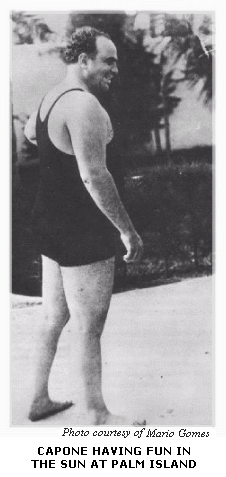 Capone enjoyed so much affluence in 1927 that he turned up in the official greeting party when Commander Francesco da Pinedo, Mussolini's round-the-world goodwill flyer, arrived in Chicago. The municipal authorities said the mobster was on hand only to discourage anti-Fascist demonstrators from showing up. The more cynical observers said the gang overlord was there as a distinguished compatriot of the Italian air ace, period. Capone also cut quite a figure in Florida, where he had a 25-room bayside villa at Palm Island. When he attended the Stribing-Sharkey fight in Miami Beach, his ringside pew was dusted off by no one less than Jack Dempsey, official greeter for the affair. Westbrook Pegler interpreted this tableau as "a gesture of good fellowship and an exchange of amenities between two professions having much in common."
Capone enjoyed so much affluence in 1927 that he turned up in the official greeting party when Commander Francesco da Pinedo, Mussolini's round-the-world goodwill flyer, arrived in Chicago. The municipal authorities said the mobster was on hand only to discourage anti-Fascist demonstrators from showing up. The more cynical observers said the gang overlord was there as a distinguished compatriot of the Italian air ace, period. Capone also cut quite a figure in Florida, where he had a 25-room bayside villa at Palm Island. When he attended the Stribing-Sharkey fight in Miami Beach, his ringside pew was dusted off by no one less than Jack Dempsey, official greeter for the affair. Westbrook Pegler interpreted this tableau as "a gesture of good fellowship and an exchange of amenities between two professions having much in common."
The St. Valentine's Day massacre came as a jarring note during one Capone sojourn in the Florida sun. Since it suggested a new round of inter-gang violence, the Big Guy summoned a Council of Peace in the Hotel President in Atlantic City. But the friendly delegates from Chicago couldn't offer any guarantees that the anti-Capone factions would behave themselves with so much blood already spilled on their side. Indeed, they told the boss that he might be on the spot marked X.
Prisoner's Song
"I haven't had any peace of mind . . . it's a tough life . . ."
--AL CAPONE
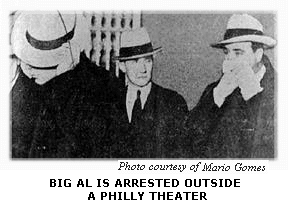 Enroute from Atlantic City, supposedly on the way back to Chicago to take things in hand, the paunchy Al Capone got arrested in Philadelphia. It looked prearranged. Two detectives encountered Alphonse and a bodyguard, Frank (Big) Cline, outside a movie and after the proper introductions and flashing of badges Capone said, "Oh, bulls. All right, here's my gun. "Indicted the very next day, Capone pleaded guilty on the gun charge and drew a year in jail. "He was running away from a gang which was out to kill him," Mayor Harry A. Mackey said. "If he hadn't been glad to go to jail, I think he would have fought the case to the last." Major Lemuel B. Schofield, Philadelphia's Director of Public Safety, talked at length to Capone and got a first-hand picture of a gangland Goliath suddenly smitten with disquieting reflections.
Enroute from Atlantic City, supposedly on the way back to Chicago to take things in hand, the paunchy Al Capone got arrested in Philadelphia. It looked prearranged. Two detectives encountered Alphonse and a bodyguard, Frank (Big) Cline, outside a movie and after the proper introductions and flashing of badges Capone said, "Oh, bulls. All right, here's my gun. "Indicted the very next day, Capone pleaded guilty on the gun charge and drew a year in jail. "He was running away from a gang which was out to kill him," Mayor Harry A. Mackey said. "If he hadn't been glad to go to jail, I think he would have fought the case to the last." Major Lemuel B. Schofield, Philadelphia's Director of Public Safety, talked at length to Capone and got a first-hand picture of a gangland Goliath suddenly smitten with disquieting reflections.
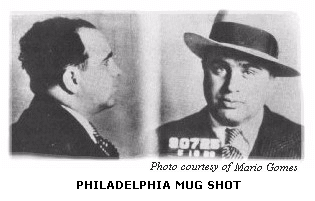 "I'm like any other man" said the Quaker City's distinguished guest. "I've been in this racket long enough to realize that a man in my game must take the breaks, the fortunes of war. Three of my friends were killed in the last three weeks in Chicago. That certainly isn't conducive to peace of mind. I haven't had any peace of mind in years. Every minute I was in danger of death. Even when we're on a peace errand we must hide from the rest of the racketeers . . . Why, when I went to Atlantic City I registered under a fictitious name."
"I'm like any other man" said the Quaker City's distinguished guest. "I've been in this racket long enough to realize that a man in my game must take the breaks, the fortunes of war. Three of my friends were killed in the last three weeks in Chicago. That certainly isn't conducive to peace of mind. I haven't had any peace of mind in years. Every minute I was in danger of death. Even when we're on a peace errand we must hide from the rest of the racketeers . . . Why, when I went to Atlantic City I registered under a fictitious name."
Capone said he had been trying to quit the mobs for two years.
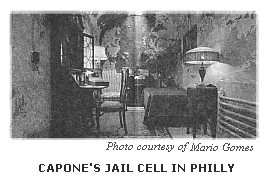 "Once in the racket you are always in it, it seems," Schofield quoted him. "The parasites will trail you begging for money and favors and you can never get away from them no matter where you go. I have a wife and a boy�who is eleven--a lad I idolize--and a beautiful home in Florida. If I could go there and forget it all I would be the happiest man in the world. I want peace and I will live and let live. I'm tired of gang murders and gang shootings . . . it's a tough life to lead. You fear death every moment and, worse than death, you fear the rats of the game who would run around and tell the police if you don't constantly satisfy them with money and favors."
"Once in the racket you are always in it, it seems," Schofield quoted him. "The parasites will trail you begging for money and favors and you can never get away from them no matter where you go. I have a wife and a boy�who is eleven--a lad I idolize--and a beautiful home in Florida. If I could go there and forget it all I would be the happiest man in the world. I want peace and I will live and let live. I'm tired of gang murders and gang shootings . . . it's a tough life to lead. You fear death every moment and, worse than death, you fear the rats of the game who would run around and tell the police if you don't constantly satisfy them with money and favors."
The lament ended on a plaintive note that was fraught with historical oversights in its more significant passages:
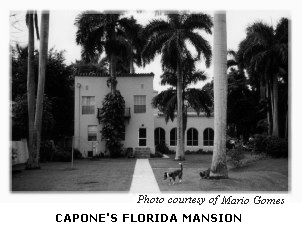 "I was never able to leave home without my bodyguard. He has been with me constantly for two years. I have never been convicted of a crime, never, nor have I ever directed anyone else to commit a crime. I don't pose as a plaster saint, but I never killed anyone. And I am known all over the world as a millionaire gorilla."
"I was never able to leave home without my bodyguard. He has been with me constantly for two years. I have never been convicted of a crime, never, nor have I ever directed anyone else to commit a crime. I don't pose as a plaster saint, but I never killed anyone. And I am known all over the world as a millionaire gorilla."
Capone had a reasonably comfortable time in the pen. He managed to keep in touch with his many enterprises over the warden's phone and in his moments of solitude he read Country Life magazine, dipping into the nicer cultural levels of the twenties. When he got out, Genevieve Forbes Herrick of the Chicago Tribune obtained an audience with him.
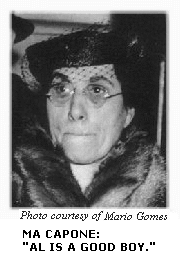 "You know, lady, I'd rather the newspapers wouldn't print a line about me," Capone said. "That's the way I feel. No brass band for me. There's a lot of grief attached to the limelight. Say, if I was just plain Izzy Polatski, living in Chicago, I'd not stand out in the gutter trying to get a peek at Capone. I'd attend to my business and let him attend to his; no use making a laughingstock of the city . . . All I ever did was supply a demand that was pretty popular. Why, the very guys that make my trade good are the ones that yell the loudest about me . . . They talk about me not being on the legitimate. Why, lady, nobody's on the legit when it comes down to cases; you know that . . . Fred Pasley heard variations on the same theme when he talked to the mobster in his office in Chicago's Lexington Hotel--under photos of the man's two heroes, George Washington and William Hale Thompson, the soul of tolerance and understanding whenever he was Mayor of Chicago.
"You know, lady, I'd rather the newspapers wouldn't print a line about me," Capone said. "That's the way I feel. No brass band for me. There's a lot of grief attached to the limelight. Say, if I was just plain Izzy Polatski, living in Chicago, I'd not stand out in the gutter trying to get a peek at Capone. I'd attend to my business and let him attend to his; no use making a laughingstock of the city . . . All I ever did was supply a demand that was pretty popular. Why, the very guys that make my trade good are the ones that yell the loudest about me . . . They talk about me not being on the legitimate. Why, lady, nobody's on the legit when it comes down to cases; you know that . . . Fred Pasley heard variations on the same theme when he talked to the mobster in his office in Chicago's Lexington Hotel--under photos of the man's two heroes, George Washington and William Hale Thompson, the soul of tolerance and understanding whenever he was Mayor of Chicago.
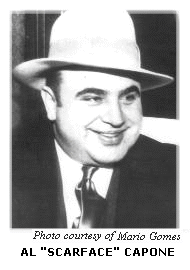 "All I ever did," said Scarface Al, "was to sell beer and whiskey to our best people . . . Why, some of the leading judges use the stuff . . . If people did not want beer and wouldn't drink it, a fellow would be crazy for going around trying to sell it. I've seen gambling houses, too, in my travels, you understand, and I never saw anyone point a gun at a man and make him go in. I never heard of anyone being forced to go to a place to have some fun."
"All I ever did," said Scarface Al, "was to sell beer and whiskey to our best people . . . Why, some of the leading judges use the stuff . . . If people did not want beer and wouldn't drink it, a fellow would be crazy for going around trying to sell it. I've seen gambling houses, too, in my travels, you understand, and I never saw anyone point a gun at a man and make him go in. I never heard of anyone being forced to go to a place to have some fun."
There was at least one item the suddenly loquacious badman overlooked when he drew his self-portrait as an earnest tradesman catering to Dry America's thirst. No less than 500 murders occurred in Chicago and the Syndicate's captive suburbs during the Lawless Decade. Alphonse Capone didn't start signing the death warrants until he inherited the golden quill from Johnny Torrio in 1925, so he couldn't be taxed with all the carnage. He did have a clammy paw in some of it--the lion's share, let's say. In short, he really was not a nice boy, no matter how much he yearned to serve his fellow citizen's craving in the booze, gambling and flesh marts.
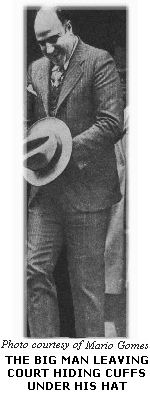 Uncle Sam Steps In
Uncle Sam Steps In
News item, vintage '29: Al Capone, citizen of Chicago, offered the government $4,000,000 to settle his income tax delinquencies. The government turned it down.
Herbert Hoover was barely settled in the White House in the spring of 1929 when he was visited by Colonel Frank Knox, publisher of the Chicago Daily News, and some troubled citizens. The delegation acquainted the new President with the more terrible facts of life in their town and asked for federal help. Hoover, distressed, thereupon told Andrew Mellon, Secretary of the Treasury, to see if the T-Men could break Al Capone's iron grip on Chicago. Mellon called in Elmer L. Irey, chief of his enforcement branch, and gave him the assignment.
The T-Men had a nice running start on the case. For years they had been trailing around after Al's big brother Ralph, called Bottles, in an effort to shake him loose from some paltry income tax payments. Their inquiries showed that Bottles, a gambler and horse fancier, had deposited $1,751, 840.60 in a single bank account from 1924 to 1929 while alternately ignoring the tax laws or pleading poverty. Bottles drew a three-year prison sentence and a $10,000 fine in the winter of 1929 and then Mellon called in Irey again. Irey set down the conversation in his book, The Tax Dodgers:
"Mr. Irey," Mellon said, "do you know about President Hoover's medicine-ball cabinet?"
"I've read about it." It was the kind of group of men who later would be called a "Brain Trust," who gathered each morning at the White House to toss medicine balls with the President, and incidentally plot the course of the nation.
Mellon went on. "Do you know how those sessions start and finish?"
That was easy. I didn't.
"Well," the Secretary said, "when the exercising starts Mr. Hoover says, 'Have you got that fellow Capone, yet?' And when exercise is done and everybody is leaving, the last thing Mr. Hoover always says is, 'Remember, now; I want that man Capone in jail.'"
"Yes, Mr. Secretary," I said as I left.
| |
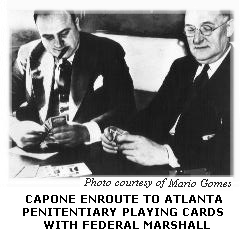 Irey sat down with Arthur P. Madden, the Intelligence Unit Agent-in-Charge in Chicago, and two of Madden's men, Frank Wilson and Pat O'Rourke. Wilson was assigned to check on all the books and records seized in Chicago gambling raids over a period of years. The tougher job went to O'Rourke. His orders were to acquire the trappings of an eastern hoodlum and worm his way into the Al Capone gang, which he did. The early Wilson-O'Rourke researches put two of the mob's top lieutenants in jail on tax charges--Jake Guzik and Frank (The Enforcer) Nitti. This so unnerved the Boss that he dropped in on Wilson and announced that he certainly wanted to pay his own just debts--up to $4,000,000 or so if Uncle Sam thought him delinquent in his tax payments.
Irey sat down with Arthur P. Madden, the Intelligence Unit Agent-in-Charge in Chicago, and two of Madden's men, Frank Wilson and Pat O'Rourke. Wilson was assigned to check on all the books and records seized in Chicago gambling raids over a period of years. The tougher job went to O'Rourke. His orders were to acquire the trappings of an eastern hoodlum and worm his way into the Al Capone gang, which he did. The early Wilson-O'Rourke researches put two of the mob's top lieutenants in jail on tax charges--Jake Guzik and Frank (The Enforcer) Nitti. This so unnerved the Boss that he dropped in on Wilson and announced that he certainly wanted to pay his own just debts--up to $4,000,000 or so if Uncle Sam thought him delinquent in his tax payments.
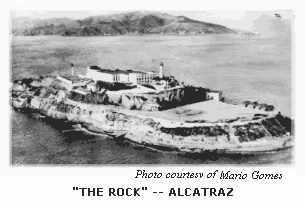 But it was too late for deals. Capone was accused of tax evasion for the years 1924 through to 1929. The indictments, touching only on the barest portions of the gangster's enterprises, charged that Johnny Torrio's one-time $75-a-week strong-arm man owed $215,030.48 on an income of $1,038,654.84 during the dandy years. The Department of Justice, suddenly aroused, chimed in with 5,000 separate indictments for bootlegging. Capone was tried in the tax cases in October, 1931, and found guilty. Judge James H. Wilkerson sentenced him to eleven years in prison, $50,000 in fines and $30,000 in costs. In the courthouse elevator a few minutes later, Capone ran into Pat O'Rourke. "The only thing that fooled me was your looks," he told the agent, "you look like a Wop."
But it was too late for deals. Capone was accused of tax evasion for the years 1924 through to 1929. The indictments, touching only on the barest portions of the gangster's enterprises, charged that Johnny Torrio's one-time $75-a-week strong-arm man owed $215,030.48 on an income of $1,038,654.84 during the dandy years. The Department of Justice, suddenly aroused, chimed in with 5,000 separate indictments for bootlegging. Capone was tried in the tax cases in October, 1931, and found guilty. Judge James H. Wilkerson sentenced him to eleven years in prison, $50,000 in fines and $30,000 in costs. In the courthouse elevator a few minutes later, Capone ran into Pat O'Rourke. "The only thing that fooled me was your looks," he told the agent, "you look like a Wop."
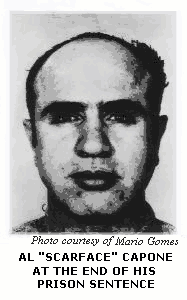 The Big Guy hardly seemed angry. Capone was sent to the Federal Prison at Atlanta, where he worked in the overall shop. Later he was transferred to Alcatraz. With time deducted for good behavior, he got off the Rock in mid-January, 1939, but by then he was a human wreck. He had spent eight years behind bars in deadly, quaking fear of his life and towards the end an old case of syphilis affected his brain. He came out a paretic and retired to his Miami Beach estate, his empire taken over by the formidable post-Prohibition syndicates led by such peace-abiding outlaws as Frank Costello. Capone lingered until 1947 and when he died, at 48, he was only a dim memory to most Americans. He may have had the last laugh at that: He trampled on the law for ten years but it took nothing less than the national government itself to smash his monumental authority; he could buy local and state
governments as he pleased. Quite a note for a simple immigrant from Naples.
The Big Guy hardly seemed angry. Capone was sent to the Federal Prison at Atlanta, where he worked in the overall shop. Later he was transferred to Alcatraz. With time deducted for good behavior, he got off the Rock in mid-January, 1939, but by then he was a human wreck. He had spent eight years behind bars in deadly, quaking fear of his life and towards the end an old case of syphilis affected his brain. He came out a paretic and retired to his Miami Beach estate, his empire taken over by the formidable post-Prohibition syndicates led by such peace-abiding outlaws as Frank Costello. Capone lingered until 1947 and when he died, at 48, he was only a dim memory to most Americans. He may have had the last laugh at that: He trampled on the law for ten years but it took nothing less than the national government itself to smash his monumental authority; he could buy local and state
governments as he pleased. Quite a note for a simple immigrant from Naples.
[ more 1929 ]
[ previous page ]
[ back to top ]
[ next page ]
copyright © Estate of Paul Sann
NOTICE OF COPYRIGHT
|





 Al Capone never could have made it as a model for collar ads: He had a flat nose, thick lips, a bull neck and a scar from his left ear to his lip. He liked to call it a war wound but it really was a memento of a knife fight in a Brooklyn dance hall. Al only made the fourth grade in school but he proved that a diligent, dedicated man could go far without formal education. He came up the hard way: street fights, petty thefts, warehouse heists, rough stuff in New York's Five Points Gang, two murder raps to shake off. In this process, the boy from Brooklyn developed a suitable boldness for the years ahead.
Al Capone never could have made it as a model for collar ads: He had a flat nose, thick lips, a bull neck and a scar from his left ear to his lip. He liked to call it a war wound but it really was a memento of a knife fight in a Brooklyn dance hall. Al only made the fourth grade in school but he proved that a diligent, dedicated man could go far without formal education. He came up the hard way: street fights, petty thefts, warehouse heists, rough stuff in New York's Five Points Gang, two murder raps to shake off. In this process, the boy from Brooklyn developed a suitable boldness for the years ahead. Johnny Torrio brought Al Capone to Chicago in 1920. The stocky hoodlum started out as a mere bodyguard but soon was put in charge of the Four Deuces Cafe, the South Wabash Avenue pleasure dome where Torrio maintained his headquarters. The Cafe had a saloon on the first floor, gambling traps on the second and third and girls-for-hire on the top story--for those who got past the lower plateaus both solvent and willing. Capone, then known as Scarface Al Brown, handled the cafe and other chores so well that Torrio put him in charge in 1923 when the Syndicate branched out into Cicero and the other neighboring towns tapped for exploitation. Pretty soon Scarface was wearing Chesterfield overcoats and monogrammed shirts and looking very much the gentleman.
Johnny Torrio brought Al Capone to Chicago in 1920. The stocky hoodlum started out as a mere bodyguard but soon was put in charge of the Four Deuces Cafe, the South Wabash Avenue pleasure dome where Torrio maintained his headquarters. The Cafe had a saloon on the first floor, gambling traps on the second and third and girls-for-hire on the top story--for those who got past the lower plateaus both solvent and willing. Capone, then known as Scarface Al Brown, handled the cafe and other chores so well that Torrio put him in charge in 1923 when the Syndicate branched out into Cicero and the other neighboring towns tapped for exploitation. Pretty soon Scarface was wearing Chesterfield overcoats and monogrammed shirts and looking very much the gentleman. Even with that kind of Hollywood-style melodramatics the nation paid little attention to Cicero and the lesser baronies outside the Windy City. There was too much going on in Chicago itself: the assassination of Dion O'Banion ("His head got away from his hat," Capone said), the war between the O'Banion heirs and the House of Genna, the attempt on Torrio's life, the battle over the Unione Siciliana and the political warfare between Big Bill Thompson's corrupt Republican machine and the reform administrations of Mayor Dever. So Capone stayed out of the papers, for the most part, until the chilly, bullet. riddled afternoon of September 20, 1926, when an armed convoy rode down on him in Cicero.
Even with that kind of Hollywood-style melodramatics the nation paid little attention to Cicero and the lesser baronies outside the Windy City. There was too much going on in Chicago itself: the assassination of Dion O'Banion ("His head got away from his hat," Capone said), the war between the O'Banion heirs and the House of Genna, the attempt on Torrio's life, the battle over the Unione Siciliana and the political warfare between Big Bill Thompson's corrupt Republican machine and the reform administrations of Mayor Dever. So Capone stayed out of the papers, for the most part, until the chilly, bullet. riddled afternoon of September 20, 1926, when an armed convoy rode down on him in Cicero. There were eight touring cars in the deadly battalion that raked the Hawthorne Hotel, the Capone GHQ. The wonder was that nobody got killed in the greater clatter of machine-gun fire as the sedans rolled slowly by. Capone hugged the floor of the hotel's restaurant and emerged with nothing more than flecks of dust on his tailor-made suit. "What shooting?" he asked when the ever-friendly local police came by. Then Cicero's Duce took steps to see that a neutral casualty--a woman hurt by stray bullets and flying windshield glass--received proper medical care. He boasted later that he spent $10,000 saving the lady's eyesight.
There were eight touring cars in the deadly battalion that raked the Hawthorne Hotel, the Capone GHQ. The wonder was that nobody got killed in the greater clatter of machine-gun fire as the sedans rolled slowly by. Capone hugged the floor of the hotel's restaurant and emerged with nothing more than flecks of dust on his tailor-made suit. "What shooting?" he asked when the ever-friendly local police came by. Then Cicero's Duce took steps to see that a neutral casualty--a woman hurt by stray bullets and flying windshield glass--received proper medical care. He boasted later that he spent $10,000 saving the lady's eyesight. The daylight raid on Fortress Capone generally was attributed to Deanie O'Banion's avenging angels, Hymie Weiss, Schemer Drucci and Bugs Moran. Weiss paid with his life three weeks later. He was cut down by six assassins opposite the Holy Name Cathedral in Chicago, and Capone himself wrote the epitaph. "Hymie is dead because he was a bullhead," he said. "Forty times I've tried to arrange things so we'd have peace and life would be worth living but he couldn't be told anything." Drucci followed Weiss to the grave by a curious route--a young cop blew his brains out in a quarrel of sorts while taking him to a station house for questioning over some election-day polling-place bombings.
The daylight raid on Fortress Capone generally was attributed to Deanie O'Banion's avenging angels, Hymie Weiss, Schemer Drucci and Bugs Moran. Weiss paid with his life three weeks later. He was cut down by six assassins opposite the Holy Name Cathedral in Chicago, and Capone himself wrote the epitaph. "Hymie is dead because he was a bullhead," he said. "Forty times I've tried to arrange things so we'd have peace and life would be worth living but he couldn't be told anything." Drucci followed Weiss to the grave by a curious route--a young cop blew his brains out in a quarrel of sorts while taking him to a station house for questioning over some election-day polling-place bombings.  The cold statistics, however mountainous, hardly told the Capone story in terms of its real impact on the American scene in the Lawless Decade. A garden-variety hood spawned in the poolrooms and gutters of New York, Scarface Al rose to heights never before scaled. He was the New Power, bigger than the city and bigger than the state. He was the Mayor, Governor and Machine Boss all rolled into one. He gave the orders; the people's elected servants carried them out and kept their mouths shut. Capone's iron rule embraced not only Chicago but whatever other parts of Illinois he had the time and inclination to exploit. His authority was so great it could not be measured.
The cold statistics, however mountainous, hardly told the Capone story in terms of its real impact on the American scene in the Lawless Decade. A garden-variety hood spawned in the poolrooms and gutters of New York, Scarface Al rose to heights never before scaled. He was the New Power, bigger than the city and bigger than the state. He was the Mayor, Governor and Machine Boss all rolled into one. He gave the orders; the people's elected servants carried them out and kept their mouths shut. Capone's iron rule embraced not only Chicago but whatever other parts of Illinois he had the time and inclination to exploit. His authority was so great it could not be measured. Thus two men were convicted in gang murders in a four-year period during which Capone and his mob rivals knocked off 227 men. Thus Big Bill Thompson ran for Mayor of Chicago against the reformer Dever in 1927 with a crystal-clear pledge of a wide-open town. "We'll not only reopen places these people have closed," Thompson said, "but we'll open 10,000 new ones." It sounded more like a promise to Capone than to the electorate, and it figured. The Syndicate stood behind the Thompson campaign with a fortune in cash and a formidable armed force besides. James M. Ragen, the racing-wire magnate, later murdered, termed the Capone mob "as strong as the United States Army." It wasn't, of course, but it surely was as strong as the City of Chicago itself after Thompson ousted the old-fashioned Dever. How strong? Fred Pasley, Capone's biographer, referred to the swarthy racket overlord as "the municipal cabinet member without portfolio--Commissioner of Lawlessness. To the upright Drys he was anathema, to the downright Wets a public benefactor, to the politicians Santa Claus." No power either as brazen or as great as Al Capone's ever existed before in an American metropolis. Perhaps none would again; the underworld syndicates that came in his wake, while formidable indeed, never ran quite as wild and free as Capone's.
Thus two men were convicted in gang murders in a four-year period during which Capone and his mob rivals knocked off 227 men. Thus Big Bill Thompson ran for Mayor of Chicago against the reformer Dever in 1927 with a crystal-clear pledge of a wide-open town. "We'll not only reopen places these people have closed," Thompson said, "but we'll open 10,000 new ones." It sounded more like a promise to Capone than to the electorate, and it figured. The Syndicate stood behind the Thompson campaign with a fortune in cash and a formidable armed force besides. James M. Ragen, the racing-wire magnate, later murdered, termed the Capone mob "as strong as the United States Army." It wasn't, of course, but it surely was as strong as the City of Chicago itself after Thompson ousted the old-fashioned Dever. How strong? Fred Pasley, Capone's biographer, referred to the swarthy racket overlord as "the municipal cabinet member without portfolio--Commissioner of Lawlessness. To the upright Drys he was anathema, to the downright Wets a public benefactor, to the politicians Santa Claus." No power either as brazen or as great as Al Capone's ever existed before in an American metropolis. Perhaps none would again; the underworld syndicates that came in his wake, while formidable indeed, never ran quite as wild and free as Capone's.
 The payroll of the Midwest underworld czar's private army-including the lavish "ice" handouts to the police and political fixers that stood behind the Syndicate, left Capone an estimated $30,000,000 or so for his own purse. That's a staggering figure, but the man himself kicked around some towering numbers. He said in 1929 that in the brief years of his greatest prosperity his personal gambling adventures--he liked horses and dice--cost him $10,000,000 in pocket money. With or without his private vices, he had tastes that might be considered extravagant even for the Get-Rich-Quick Era. He had an 11-1/2-carat diamond ring that cost $50,000 and his custom-built, seven-ton limousine, steel-plated to discourage assassins, cost $30,000. He maintained a suitable town house in Chicago's Grand, at Crossing District; his Irish wife and son and the whole Clan Capone never wanted for the comforts befitting great wealth.
The payroll of the Midwest underworld czar's private army-including the lavish "ice" handouts to the police and political fixers that stood behind the Syndicate, left Capone an estimated $30,000,000 or so for his own purse. That's a staggering figure, but the man himself kicked around some towering numbers. He said in 1929 that in the brief years of his greatest prosperity his personal gambling adventures--he liked horses and dice--cost him $10,000,000 in pocket money. With or without his private vices, he had tastes that might be considered extravagant even for the Get-Rich-Quick Era. He had an 11-1/2-carat diamond ring that cost $50,000 and his custom-built, seven-ton limousine, steel-plated to discourage assassins, cost $30,000. He maintained a suitable town house in Chicago's Grand, at Crossing District; his Irish wife and son and the whole Clan Capone never wanted for the comforts befitting great wealth. Capone enjoyed so much affluence in 1927 that he turned up in the official greeting party when Commander Francesco da Pinedo, Mussolini's round-the-world goodwill flyer, arrived in Chicago. The municipal authorities said the mobster was on hand only to discourage anti-Fascist demonstrators from showing up. The more cynical observers said the gang overlord was there as a distinguished compatriot of the Italian air ace, period. Capone also cut quite a figure in Florida, where he had a 25-room bayside villa at Palm Island. When he attended the Stribing-Sharkey fight in Miami Beach, his ringside pew was dusted off by no one less than Jack Dempsey, official greeter for the affair. Westbrook Pegler interpreted this tableau as "a gesture of good fellowship and an exchange of amenities between two professions having much in common."
Capone enjoyed so much affluence in 1927 that he turned up in the official greeting party when Commander Francesco da Pinedo, Mussolini's round-the-world goodwill flyer, arrived in Chicago. The municipal authorities said the mobster was on hand only to discourage anti-Fascist demonstrators from showing up. The more cynical observers said the gang overlord was there as a distinguished compatriot of the Italian air ace, period. Capone also cut quite a figure in Florida, where he had a 25-room bayside villa at Palm Island. When he attended the Stribing-Sharkey fight in Miami Beach, his ringside pew was dusted off by no one less than Jack Dempsey, official greeter for the affair. Westbrook Pegler interpreted this tableau as "a gesture of good fellowship and an exchange of amenities between two professions having much in common." Enroute from Atlantic City, supposedly on the way back to Chicago to take things in hand, the paunchy Al Capone got arrested in Philadelphia. It looked prearranged. Two detectives encountered Alphonse and a bodyguard, Frank (Big) Cline, outside a movie and after the proper introductions and flashing of badges Capone said, "Oh, bulls. All right, here's my gun. "Indicted the very next day, Capone pleaded guilty on the gun charge and drew a year in jail. "He was running away from a gang which was out to kill him," Mayor Harry A. Mackey said. "If he hadn't been glad to go to jail, I think he would have fought the case to the last." Major Lemuel B. Schofield, Philadelphia's Director of Public Safety, talked at length to Capone and got a first-hand picture of a gangland Goliath suddenly smitten with disquieting reflections.
Enroute from Atlantic City, supposedly on the way back to Chicago to take things in hand, the paunchy Al Capone got arrested in Philadelphia. It looked prearranged. Two detectives encountered Alphonse and a bodyguard, Frank (Big) Cline, outside a movie and after the proper introductions and flashing of badges Capone said, "Oh, bulls. All right, here's my gun. "Indicted the very next day, Capone pleaded guilty on the gun charge and drew a year in jail. "He was running away from a gang which was out to kill him," Mayor Harry A. Mackey said. "If he hadn't been glad to go to jail, I think he would have fought the case to the last." Major Lemuel B. Schofield, Philadelphia's Director of Public Safety, talked at length to Capone and got a first-hand picture of a gangland Goliath suddenly smitten with disquieting reflections. "I'm like any other man" said the Quaker City's distinguished guest. "I've been in this racket long enough to realize that a man in my game must take the breaks, the fortunes of war. Three of my friends were killed in the last three weeks in Chicago. That certainly isn't conducive to peace of mind. I haven't had any peace of mind in years. Every minute I was in danger of death. Even when we're on a peace errand we must hide from the rest of the racketeers . . . Why, when I went to Atlantic City I registered under a fictitious name."
"I'm like any other man" said the Quaker City's distinguished guest. "I've been in this racket long enough to realize that a man in my game must take the breaks, the fortunes of war. Three of my friends were killed in the last three weeks in Chicago. That certainly isn't conducive to peace of mind. I haven't had any peace of mind in years. Every minute I was in danger of death. Even when we're on a peace errand we must hide from the rest of the racketeers . . . Why, when I went to Atlantic City I registered under a fictitious name." "Once in the racket you are always in it, it seems," Schofield quoted him. "The parasites will trail you begging for money and favors and you can never get away from them no matter where you go. I have a wife and a boy�who is eleven--a lad I idolize--and a beautiful home in Florida. If I could go there and forget it all I would be the happiest man in the world. I want peace and I will live and let live. I'm tired of gang murders and gang shootings . . . it's a tough life to lead. You fear death every moment and, worse than death, you fear the rats of the game who would run around and tell the police if you don't constantly satisfy them with money and favors."
"Once in the racket you are always in it, it seems," Schofield quoted him. "The parasites will trail you begging for money and favors and you can never get away from them no matter where you go. I have a wife and a boy�who is eleven--a lad I idolize--and a beautiful home in Florida. If I could go there and forget it all I would be the happiest man in the world. I want peace and I will live and let live. I'm tired of gang murders and gang shootings . . . it's a tough life to lead. You fear death every moment and, worse than death, you fear the rats of the game who would run around and tell the police if you don't constantly satisfy them with money and favors." "I was never able to leave home without my bodyguard. He has been with me constantly for two years. I have never been convicted of a crime, never, nor have I ever directed anyone else to commit a crime. I don't pose as a plaster saint, but I never killed anyone. And I am known all over the world as a millionaire gorilla."
"I was never able to leave home without my bodyguard. He has been with me constantly for two years. I have never been convicted of a crime, never, nor have I ever directed anyone else to commit a crime. I don't pose as a plaster saint, but I never killed anyone. And I am known all over the world as a millionaire gorilla." "You know, lady, I'd rather the newspapers wouldn't print a line about me," Capone said. "That's the way I feel. No brass band for me. There's a lot of grief attached to the limelight. Say, if I was just plain Izzy Polatski, living in Chicago, I'd not stand out in the gutter trying to get a peek at Capone. I'd attend to my business and let him attend to his; no use making a laughingstock of the city . . . All I ever did was supply a demand that was pretty popular. Why, the very guys that make my trade good are the ones that yell the loudest about me . . . They talk about me not being on the legitimate. Why, lady, nobody's on the legit when it comes down to cases; you know that . . . Fred Pasley heard variations on the same theme when he talked to the mobster in his office in Chicago's Lexington Hotel--under photos of the man's two heroes, George Washington and William Hale Thompson, the soul of tolerance and understanding whenever he was Mayor of Chicago.
"You know, lady, I'd rather the newspapers wouldn't print a line about me," Capone said. "That's the way I feel. No brass band for me. There's a lot of grief attached to the limelight. Say, if I was just plain Izzy Polatski, living in Chicago, I'd not stand out in the gutter trying to get a peek at Capone. I'd attend to my business and let him attend to his; no use making a laughingstock of the city . . . All I ever did was supply a demand that was pretty popular. Why, the very guys that make my trade good are the ones that yell the loudest about me . . . They talk about me not being on the legitimate. Why, lady, nobody's on the legit when it comes down to cases; you know that . . . Fred Pasley heard variations on the same theme when he talked to the mobster in his office in Chicago's Lexington Hotel--under photos of the man's two heroes, George Washington and William Hale Thompson, the soul of tolerance and understanding whenever he was Mayor of Chicago. "All I ever did," said Scarface Al, "was to sell beer and whiskey to our best people . . . Why, some of the leading judges use the stuff . . . If people did not want beer and wouldn't drink it, a fellow would be crazy for going around trying to sell it. I've seen gambling houses, too, in my travels, you understand, and I never saw anyone point a gun at a man and make him go in. I never heard of anyone being forced to go to a place to have some fun."
"All I ever did," said Scarface Al, "was to sell beer and whiskey to our best people . . . Why, some of the leading judges use the stuff . . . If people did not want beer and wouldn't drink it, a fellow would be crazy for going around trying to sell it. I've seen gambling houses, too, in my travels, you understand, and I never saw anyone point a gun at a man and make him go in. I never heard of anyone being forced to go to a place to have some fun." Uncle Sam Steps In
Uncle Sam Steps In Irey sat down with Arthur P. Madden, the Intelligence Unit Agent-in-Charge in Chicago, and two of Madden's men, Frank Wilson and Pat O'Rourke. Wilson was assigned to check on all the books and records seized in Chicago gambling raids over a period of years. The tougher job went to O'Rourke. His orders were to acquire the trappings of an eastern hoodlum and worm his way into the Al Capone gang, which he did. The early Wilson-O'Rourke researches put two of the mob's top lieutenants in jail on tax charges--Jake Guzik and Frank (The Enforcer) Nitti. This so unnerved the Boss that he dropped in on Wilson and announced that he certainly wanted to pay his own just debts--up to $4,000,000 or so if Uncle Sam thought him delinquent in his tax payments.
Irey sat down with Arthur P. Madden, the Intelligence Unit Agent-in-Charge in Chicago, and two of Madden's men, Frank Wilson and Pat O'Rourke. Wilson was assigned to check on all the books and records seized in Chicago gambling raids over a period of years. The tougher job went to O'Rourke. His orders were to acquire the trappings of an eastern hoodlum and worm his way into the Al Capone gang, which he did. The early Wilson-O'Rourke researches put two of the mob's top lieutenants in jail on tax charges--Jake Guzik and Frank (The Enforcer) Nitti. This so unnerved the Boss that he dropped in on Wilson and announced that he certainly wanted to pay his own just debts--up to $4,000,000 or so if Uncle Sam thought him delinquent in his tax payments. But it was too late for deals. Capone was accused of tax evasion for the years 1924 through to 1929. The indictments, touching only on the barest portions of the gangster's enterprises, charged that Johnny Torrio's one-time $75-a-week strong-arm man owed $215,030.48 on an income of $1,038,654.84 during the dandy years. The Department of Justice, suddenly aroused, chimed in with 5,000 separate indictments for bootlegging. Capone was tried in the tax cases in October, 1931, and found guilty. Judge James H. Wilkerson sentenced him to eleven years in prison, $50,000 in fines and $30,000 in costs. In the courthouse elevator a few minutes later, Capone ran into Pat O'Rourke. "The only thing that fooled me was your looks," he told the agent, "you look like a Wop."
But it was too late for deals. Capone was accused of tax evasion for the years 1924 through to 1929. The indictments, touching only on the barest portions of the gangster's enterprises, charged that Johnny Torrio's one-time $75-a-week strong-arm man owed $215,030.48 on an income of $1,038,654.84 during the dandy years. The Department of Justice, suddenly aroused, chimed in with 5,000 separate indictments for bootlegging. Capone was tried in the tax cases in October, 1931, and found guilty. Judge James H. Wilkerson sentenced him to eleven years in prison, $50,000 in fines and $30,000 in costs. In the courthouse elevator a few minutes later, Capone ran into Pat O'Rourke. "The only thing that fooled me was your looks," he told the agent, "you look like a Wop."
 The Big Guy hardly seemed angry. Capone was sent to the Federal Prison at Atlanta, where he worked in the overall shop. Later he was transferred to Alcatraz. With time deducted for good behavior, he got off the Rock in mid-January, 1939, but by then he was a human wreck. He had spent eight years behind bars in deadly, quaking fear of his life and towards the end an old case of syphilis affected his brain. He came out a paretic and retired to his Miami Beach estate, his empire taken over by the formidable post-Prohibition syndicates led by such peace-abiding outlaws as Frank Costello. Capone lingered until 1947 and when he died, at 48, he was only a dim memory to most Americans. He may have had the last laugh at that: He trampled on the law for ten years but it took nothing less than the national government itself to smash his monumental authority; he could buy local and state
governments as he pleased. Quite a note for a simple immigrant from Naples.
The Big Guy hardly seemed angry. Capone was sent to the Federal Prison at Atlanta, where he worked in the overall shop. Later he was transferred to Alcatraz. With time deducted for good behavior, he got off the Rock in mid-January, 1939, but by then he was a human wreck. He had spent eight years behind bars in deadly, quaking fear of his life and towards the end an old case of syphilis affected his brain. He came out a paretic and retired to his Miami Beach estate, his empire taken over by the formidable post-Prohibition syndicates led by such peace-abiding outlaws as Frank Costello. Capone lingered until 1947 and when he died, at 48, he was only a dim memory to most Americans. He may have had the last laugh at that: He trampled on the law for ten years but it took nothing less than the national government itself to smash his monumental authority; he could buy local and state
governments as he pleased. Quite a note for a simple immigrant from Naples.